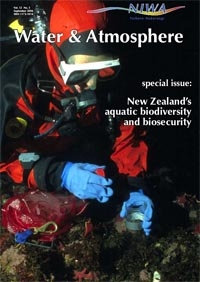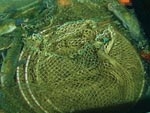PDF of this article (153 KB)

Fleur Matheson Tony Dugdale Rohan Wells Aleki Taumoepeau Josh Smith
A simple procedure can help stop the spread of aquatic pests.


There are numerous aquatic pests in New Zealand freshwater environments. Some of the better known species include koi carp, catfish, gambusia (mosquitofish) and the noxious weeds hornwort, egeria and lagarosiphon. Aquatic pests such as these are a serious threat to the unique biodiversity and quality of New Zealand’s freshwater ecosystems. Pest fish can reduce water quality, disturb sediment, displace native species and eliminate aquatic vegetation. The impacts of aquatic plant pests include dense, unsightly and hazardous weed beds, displacement of native flora, and loss of habitat for fish and other biota.
Stopping the spread
Aquatic pests, particularly fish eggs and fry and fragments of weeds, can be spread to new, unimpacted waterways in the freshwater fishing nets used by commercial fishers, researchers and management agencies during the course of their work.
Until recently, air drying has been the standard method for sterilising nets to destroy aquatic pests. This desiccates and kills most pests, but requires nets to be laid out in a dry place and left for some time (usually overnight). Unfortunately, nets don’t air-dry well in damp conditions and they often need to be re-used within short periods.
NIWA scientists have been working with the Department of Conservation, commercial fishers, and regional council staff to develop an alternative method of sterilisation. Jointly funded by DOC and the Foundation for Research, Science and Technology, this research involved identifying and testing potential treatment compounds on key target species. We tested salt, lime, copper sulphate, alcohol, chlorine, quaternary ammonium compounds, aluminium sulphate and detergent, with follow-up trials on a wider range of aquatic pests. Salt proved to be the best treatment.
A salty solution
Our tests have shown that immersing nets in a concentrated saltwater solution (70 grams salt per litre or 1 part salt to 14 parts water) for one hour is an effective sterilising treatment against most freshwater pests. Susceptible pest fish species include catfish, goldfish, koi carp, gambuisa, perch, rudd and tench; susceptible aquatic plant species include curly pondweed, elodea, egeria, hornwort, hydrilla and lagarosiphon.
Fleur Matheson, Rohan Wells, Aleki Taumoepeau and Josh Smith are based at NIWA in Hamilton; Tony Dugdale was formerly based there as well.
